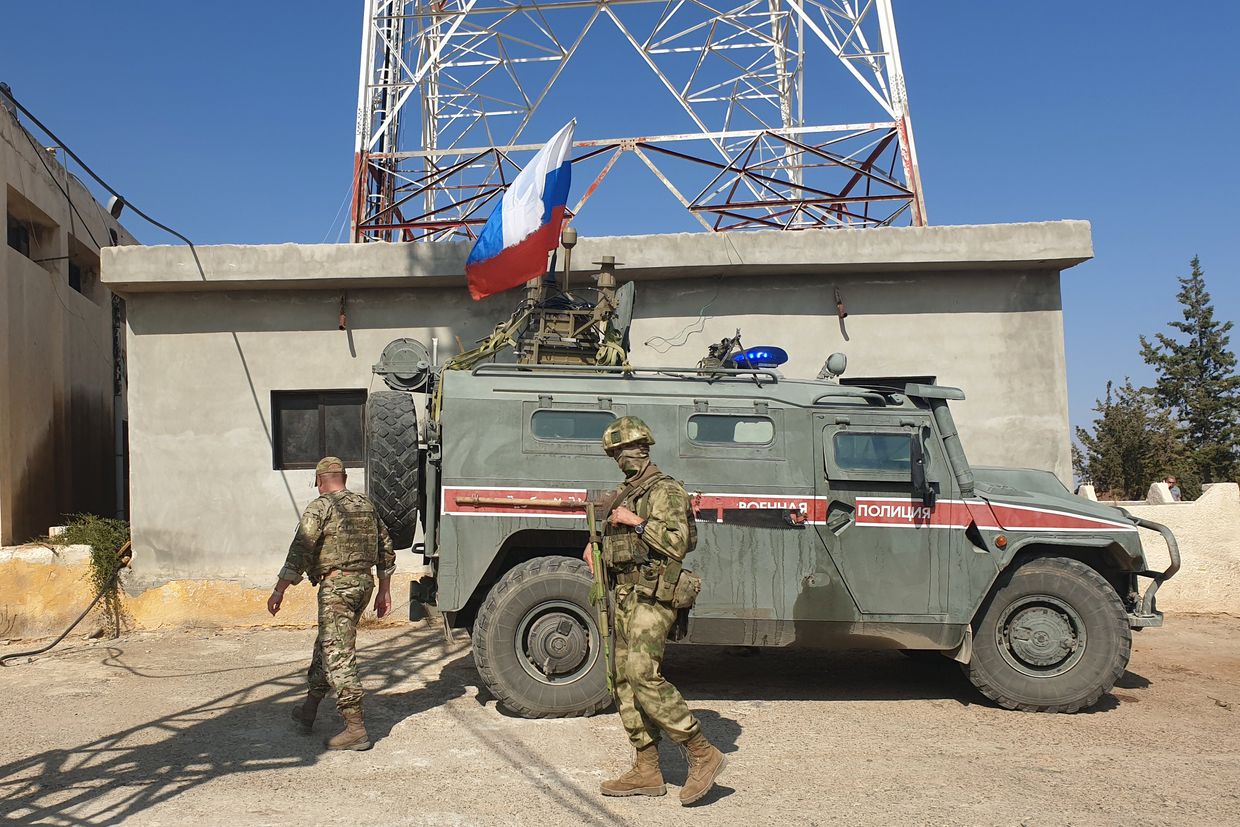What does Assad’s downfall mean for Russia and Ukraine?
The fate of Russian military bases in Syria now hangs in the balance. The Kremlin's international prestige has also suffered a heavy blow.

Russian military police members stand outside an armoured personnel carrier (APC) along a road in the countryside near the northeastern Syrian town of Amuda in Hasakeh province on Oct. 24, 2019, as part of a joint patrol between Russian forces and Syrian Kurdish Asayish internal security forces near the border with Turkey. (Delil Soulemalil/AFP via Getty Images)
As Syrian dictator Bashar al-Assad's regime collapsed in a matter of days, Russia's influence in the Middle East appeared to wane.
Preoccupied with its all-out war against Ukraine, Russia was unable to prevent the Dec. 8 downfall of its main ally in the region. The stunning rapidity of the rebels' offensive also made it hard for Russia to gather resources to boost Assad's defenses.
As Assad has fled Syria and has been granted asylum in Russia, the fate of Russian military bases in Syria now hangs in the balance. The Kremlin's international prestige has also suffered a heavy blow.
The implications of Assad's overthrow for Ukraine are less certain.
Some analysts argue that the regime's collapse will strengthen Ukraine's position in potential peace talks with Russia.
"(Assad's downfall) will serve as a major motivator for those opposed to Russia's war in Ukraine and galvanize international support for Ukraine with a renewed belief that Russia can be defeated," Neil Quilliam, a Middle East expert at Chatham House, told the Kyiv Independent.
Why did Assad fall so fast?
The lightning speed of the regime's collapse surprised observers.
"The state institutions and the military had been hollowed out over the years, and the regime focused primarily on enriching itself rather than providing services to its population, reforming the military, and engendering loyalty to the state," Quilliam said. "It collapsed because the state and the population suffered a decade of neglect, and Assad squandered the ceasefire years instead of building up support."
David Butter, another Middle East expert at Chatham House, told the Kyiv Independent that Assad's government collapsed because "it was brutal and corrupt", and he "was happy exploiting the frozen war economy for the gain of his inner circle."
"The most important reasons (for the regime's collapse) include the astonishing weakness of its military forces, especially due to low morale and corruption, and the lack of meaningful social support behind the regime," Máté Szalai, a research fellow focusing on the Middle East at the Netherlands' Clingendael Institute, told the Kyiv Independent.
"It is also true that the largest opposition alliance in Idlib led by Tahrir al-Sham managed to strengthen its institutional and military capacities to a greater extent than most anticipated."

Due to the inherent weakness of the regime and its armed forces, little was needed to topple it.
"Once (the Islamist group) Tahrir al-Sham breached the few better front-line units Assad had, the rest just unraveled," Sascha Bruchmann, a military analyst at the London-based International Institute for Strategic Studies, told the Kyiv Independent.
Allies' failure to keep Assad in power
Quilliam said that Syria's main allies, Russia and Iran, "provided very little support" to Assad's regime as it was collapsing.
"Both Russia and Iran are overstretched at present through their respective wars with Ukraine and Israel, and both lost faith in Assad to be a reliable security partner and so lost hope in being able to deploy forces and reverse rebel advances," he said.
"Iran and Hezbollah have been vanquished by Israel, and so lacked the capacity to prevent the regime from falling, and the same goes for Russia."

Butter said that "Hezbollah had been pulled out to fight in Lebanon" and "Iran's forces generally had been weakened by Israeli strikes."
"Russian air power was not useful — ok for hitting a few hospitals but not in sustained support of ground forces, which anyway had run away," he added.
Szalai argued that Russia and Iran "could have provided a bit more than they did in the last days, so it was not only a question of capabilities but also of political will."
"Despite being allies, both Moscow and Tehran were frustrated with Assad," he continued.
The speed of the rebels' offensive was also crucial for their success.
"Iran mustered forces, and the Russians flew air strikes against Tahrir al-Sham," Bruchmann said. "However, the collapse of Assad's forces was too fast. The Russians and Iranians could not stiffen up Assad's forces and took too long to organize a defense."
He added that "the fall of Deir ez-Zor and key roads in Eastern Syria meant that the vital land bridge from Iran through Iraq and into Syria was under threat while Israeli air superiority stopped Iranian military airlifts."
"The Russians knew they could not count on the Syrian army and pulled out their navy vessels from Tartus," Olli Ruohomäki, a Middle East expert at the Finnish Institute of International Affairs, told the Kyiv Independent. "(Russian military intelligence) saw the writing on the wall that this was not going to end up well."
Another problem was a lack of Syrian soldiers' motivation.
"They tried to (prevent Assad's downfall) but they failed because Assad's soldiers were not willing to fight," Matteo Colombo, a Middle East expert at the Clingendael Institute, told the Kyiv Independent.
A blow to Russia's influence in the Middle East
The collapse of Assad's regime is seen as a major blow to Russia's influence in the Middle East and its global clout.
"Russia was once admired by Middle Eastern states for being a dependable ally and was often compared to the U.S., which is characterized as a fair-weather friend," Quilliam said. "Russia has now lost that reputation, which has sent shock waves through the Middle East. As such, its influence will diminish."
Szalai argued that "the fall of Assad's regime is bad news for Russia but it is even worse news for Iran."
"From Moscow's perspective, Assad was the closest ally of the Kremlin in the region, and its bases enabled Russia to project power in the Middle East and Africa," he said. "Since 2015, the survival of the Assad regime has been the symbol and 'proof' that any government can survive with Russian military help. Now, this message is severely undermined."
He also said that the collapse of Assad's regime "undermined Iran's forward defense security strategy" since Syria "served as a bridge between its allies in Iraq and Lebanon."
Michael Sahlin, a former Swedish ambassador to Turkey and a Middle East specialist at the Stockholm International Peace Research Institute, also said that it was a huge loss for Russia since the Syrian bases "were important for its Africa policy" and allowed the Kremlin to penetrate into former French colonies in Africa.

Bruchmann agreed, saying that "Iran and Russia lost relative power to Turkey."
"Russia has rebranded itself as a staunch supporter of allies in the global South after defending Assad from 2015 on," he said. "That reputation must take a dent. Iran is losing its land corridor to an already embattled Hezbollah — its premier proxy."
The fate of Russian bases
The main risk for Russia is the potential loss of its military bases in Syria. These include the Tartus naval base, the Khmeimim air base, and smaller military facilities in other parts of the country.
Russian state news agency TASS reported on Dec. 9 that the rebels had taken over the provinces of Tartus and Latakia, where the Tartus and Khmeimim bases are located.
Meanwhile, Russia has begun withdrawing its naval and military assets from Syria amid the collapse of Assad's regime, Ukraine's military intelligence agency (HUR) said on Dec. 8.
"The current withdrawal is to avoid a disastrous last minute flight like the American withdrawal from Kabul," Erwin van Veen, a Middle East expert at the Clingendael Institute, told the Kyiv Independent.
Sahlin also said that "Russia has started to abandon the bases, and there is a trend for (the Russians) to leave Syria." He added that they did not want their military equipment to be destroyed or captured by the rebels.
TASS reported on Dec. 9, citing an official in Syria's Latakia province, that the rebels did not intend to storm the Russian bases. The news agency also cited Kremlin sources as saying that Russia was in talks with the rebels on ensuring the safety of Russian diplomats and bases in Syria.
However, analysts say it will be hard for Russia to keep the bases.

"It is difficult to imagine that Russia will be able to hold on to the bases given Moscow's unerring support of Assad until recently," Quilliam said. "Russia's targeting of schools and hospitals will never be forgotten by Syrians and international observers. It will be a major strategic loss for Russia."
Ruohomäki and Colombo also said it would be difficult and politically costly for Russia to keep its bases in Syria because of Russia's association with Assad's regime.
What does it mean for Ukraine?
Russia's decreasing influence in the Middle East and potential loss of bases may indirectly help Ukraine, analysts say.
Quilliam said that Assad's ouster could potentially boost Ukraine's leverage in future peace talks with Russia.
"Russia's exit from Syria shows that it is not invincible and that its capacity is compromised and morale amongst its force must now be even lower, and that provides negotiators with significant leverage," he added.
Other analysts argued that it is not clear what impact Assad's debacle could have on peace talks in Ukraine.
"For this to impact future negotiations, the loss of prestige will first have to translate in changed perceptions around the globe," Bruchmann said. "Unfortunately, that may take some time before capitals in the global South realize Russian support is not a real guarantee for any security problem they may face."
"However, if Russia loses access to the port of Tartus, it would weaken its position in the Mediterranean significantly and may decrease the latent threat vis-a-vis Europe," he added.
Butter said that he doesn't "see much material impact on the Ukraine war, but it is bad for Putin's image."
"(U.S. President-elect Donald) Trump has already hinted that the Syria debacle makes Putin a loser," he added.
Trump said on Dec. 8 that Russia "was not interested in protecting (Assad) any longer."
"There was no reason for Russia to be there in the first place," he wrote. "They lost all interest in Syria because of Ukraine ... a war that should never have started and could go on forever."
At the same time, Russia may redirect some or all of its troops and equipment from Syria to Ukraine. But the impact of this may be negligible.
"There aren't that many Russian troops in Syria to make a material impact on the battlefield in Ukraine," Bruchmann said.
"I don't have any good numbers, but it's probably one squadron at the air base and a few battalions of light infantry and military police. On the flip side, it will be harder to recruit Syrians from now on. It's probably another net loss for Russia, but not dramatic compared to what they lose in Ukraine every week now."













